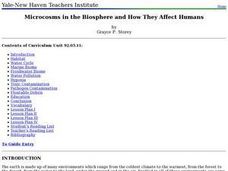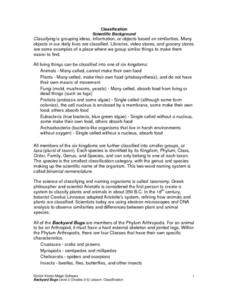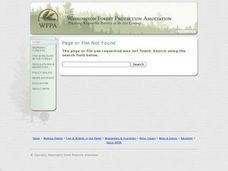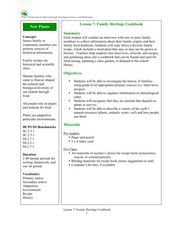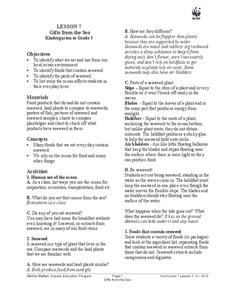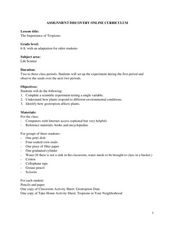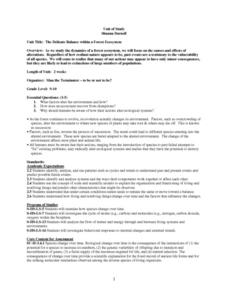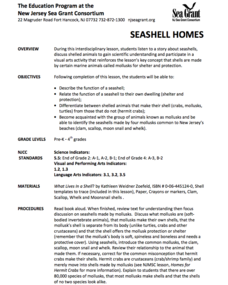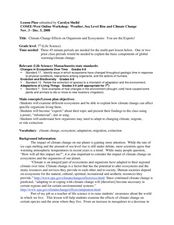Curated OER
Science: Microcosms in the Biosphere
In a series of lessons, examine the impact on humans by microcosms in the biosphere. Among the plans structured for pupils with different abilities and learning styles, are activities describing the symbiotic relationship, drawing the...
Curated OER
Backyard Bugs
Explore the concept of scientific classification and the similarities and differences between plant and animal species. Your class will participate in hands-on activities by investigating dichotomous keys and classifying their shoes. To...
Curated OER
BEETLES: The Coming Out
Students design an experiment to test the variables involved in the hatching of the Bruchid beetle.
Curated OER
Tree Identification - Up Close And Personal
Fourth graders go to an outdoor area and are assigned a specific native plant to observe. They read about and answer questions about their tree. They draw the tree. Finally, 4th graders teach the rest of the class about their tree.
Curated OER
I Wonder What a Pest Is...
Students observe what animals are considered to be pests and why. They conduct a mock trial of a honeybee arguing if it is a pest or not. They determine pros and cons of honeybees to prepare for the trial.
American Museum of Natural History
A Closer Look at Mars
A website looks at how we know so much about Mars—telescopes, robots, and spacecraft—and the search for martian life. Following the informational text are three questions that quiz pupils about possible life on Mars.
Curated OER
Ecosystem In A Bottle
Ecosystem activities show how everyone and everything is interconnected. The smallest change can make a big impact.
Curated OER
Family Heritage Cookbook
Students compare favorite family recipes. In this cultural diversity lesson, students interview family members and record favorite recipes. Students examine cultural diversity through favorite foods.
Curated OER
Gifts from the Sea
Students discover the oceanic food chain. In this healthy eating lesson, student investigate the fish we eat and the food the fish eat. Students discover what ocean animals eat seaweed and what everyday foods we eat that also...
Curated OER
Rain Forest Research
Second graders explore the Rain Forest. In this research lesson, 2nd graders go online to gather information about Rain Forest animals. Students print and use the information to write about the many parts of the Rain Forest. Students are...
Curated OER
The Importance of Tropisms
Students investigate plant tropisms using the scientific method. In this life science lesson, students learn about tropisms and test the response of corn seedlings to gravity. Response questions, extensions, and an adaptation for...
Curated OER
The Delicate Balance within a Forest Ecosystem
Students examine the causes and effects of alterations in a forest ecosystem and evaluate how human actions may only seem to have minor consequences, but can lead to extinctions of large numbers of populations. Students produce an...
Curated OER
What Would Halloween be Like Without the Ecuadorian Rainforest?
Fourth graders are given a number of typical Halloween treats and work in groups to determine which foods came from the Rainforest (chocolate) and which foods came from temperate regions (apples, popcorn) and treats that don't have...
Curated OER
Molecular Approaches to Evolution
Students examine the molecular studies of organisms that have led to a new era in their understanding of speciation and evolutionary relationships. Students study the allelic frequency of genes controlling specific molecules and assess...
Curated OER
Seashell Homes
Pupils listen to a story about seashells. They discuss shelled animals. Learners describe the function of seashell. Pupils relate the function of a seashell to their own dwelling. They differentiate between shelled animals that make...
Curated OER
The Dirt on Worms!
Fourth graders make predictions, observe, collect and record data. They investigate several soil and worm websites. Finally, 4th graders write a letter to The President which defends earthworms by explaining their value to the United...
Curated OER
Particulate Matter- How Dirty is the Air We Breathe?
Fourth graders investigate air pollution. In this air pollution lesson plan, 4th graders test the air quality by using a block of wood and petroleum jelly. Students investigate the pollutants on the wooden block.
Curated OER
Endangered Species !: Why Are Species Endangered?
Students explore the various issues and problems faced by endangered species globally. They research the plight of endangered species, create a poster of a selected animal, and present their poster and research to the class.
Curated OER
Awesome Adaptations!
Second graders explore biology by researching animal characteristics. In this adaptation instructional activity, 2nd graders identify the history of several animals and research the changes that have occurred to their anatomy over...
Curated OER
Climate Change Effects on Organisms and Ecosystems: You are the Experts!
Seventh graders research about the effect of climate on different ecosystems. In this life science lesson plan, 7th graders present their research by creating a poster, infomercial, skit or song. They discuss how organisms adapt to...
Curated OER
Understanding the Conservation of Energy
In this conservation of energy worksheet, students read about the law of conservation of energy and about energy distribution. They answer three critical thinking questions about what the law of conservation of energy means to us for...
Curated OER
Food Safety
Young scholars recognize that safe food preparation is important to good health. In this food safety lesson plan, students participate in an activity young scholars separate, clean, chill, and cook food safely. Students use Glo...
Curated OER
Mammals: Mammals and Their Ways
Students study the difference between innate and learned behaviors. They observe the adaptations and behaviors of mammals in this series of lessons.
Curated OER
Landfills: A Solid Waste Management Plan
Students are able to list the types of household waste that they produce daily. They are able to describe some other types of waste that are produced by industry or agriculture to help maintain their lifestyles. Students are able to...


